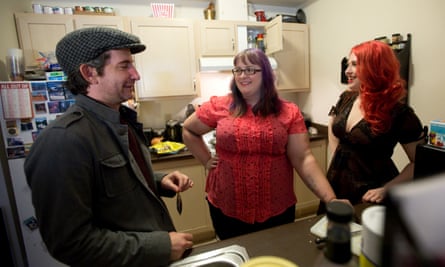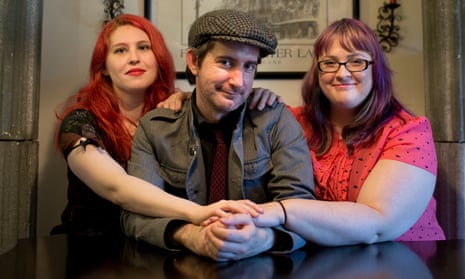When Franklin Veaux was 10 years old, his elementary school English teacher read his class a story about a princess being wooed by two princes. “I thought, princesses live in castles, and castles are big enough for all three of them, so why does she have to choose one?” he said.
Throughout his life, Franklin – now 50 and living in Portland, Oregon – has never chosen one. In fact, he’s never had a monogamous relationship in his life, even while he was married for 18 years. “Monogamy has never connected with me, it’s never made sense to me,” said Franklin, who took two dates to his high school prom and lost his virginity in a threesome.
Yet it wasn’t until the 1990s that he found the language to describe his lifestyle. Until then, he just considered himself “open”.
Polyamory is the practice of intimate relationships involving more than two people with the consent of everyone involved. In recent years, polyamory is working its way to becoming a household term. Researchers have estimated that 4 to 5% of Americans practice some form of consensual non-monogamy. A 2014 blog post by Psychology Today revealed that 9.8 million people have agreed to allow satellite lovers in their relationships, which includes poly couples, swinging couples and others practicing sexual non-monogamy.
And in Portland – home to swingers’ clubs, the most strip bars per capita, and annual porn festivals – it seems you can’t throw a stone without finding a poly relationship. Although there’s no official data supporting an exact number, various Meetup groups boast a few thousand members each, while other Facebook groups have hundreds.
“Portland is an amazing place if you’re poly, oh my god,” laughed Franklin, who is rarely seen without his bunny ears. (Given to him by a lover, he refers to the ears as “sexually transmitted”, meaning his other girlfriends now wear them too.) “It’s actually one of the most poly friendly cities I’ve been to,” he said, listing Boston, Tampa, San Francisco and Vancouver, British Columbia, as other poly hotspots. As for its social acceptability, Franklin said, “a lot of it is just exposure. It was almost impossible before the advent of the internet to find other people that were polyamorous.”

Polyamory in the public eye
That exposure has only risen recently. Showtime’s reality TV series, Polyamory: Married and Dating, has certainly helped herald the lifestyle into homes across the US. But this spring another show, hailed as television’s first polyromantic comedy, also launched. You Me Her follows married couple Jack and Emma – attractive, suburban and professional – as they enter into a polyamorous relationship with grad student Izzy. Unsurprisingly, the show is set in Portland.
“I kid that I have a Portland fetish,” said You Me Her writer and creator, John Scott Shepherd. “I just dig the city for its vibe, including the social tolerance thing, like being named the gay friendliest major city in the country.” But Shepherd said he wasn’t fully aware of Portland’s poly reputation when he chose the city for the show.
Since airing You Me Her, he’s been contacted by a number of members of the poly community. “They appreciated the creative decision to go with so-called ‘normal’ people who never thought they’d do something like this,” said Shepherd, whose show has been renewed for a second and third season. “That creative conceit seemed to reflect their experience: they don’t see themselves as ‘sex people’.”
Julie Jeske is a Portland-based counselor who works with couples identifying as poly. “Because Portland is more progressive in general, it may be easier for someone who is exploring what others may consider an alternative lifestyle,” she said. “There is more information and more support, less stigma.”
Making it work
Portland is home to numerous groups, classes, meet-ups and mailing lists dedicated to polyamory or non-monogamy, including Franklin’s Portland Polyamory Outreach Group and a student group founded by Tamela Clover, 30, a psychology and mathematics major.
“I realized pretty early on that I wanted freedom and I also wanted to be an ethical person, so I didn’t want to make commitments that I couldn’t keep … But I didn’t have a word for what I wanted,” said Tamela, who lives with her partner of seven years, Jeffry Lords, 39.
Jeffry has another partner – Gaile Parker, 31, also a psychology major – who he met on OkCupid 14 months ago. All three are in a “V” dynamic, with Jeffry as the pivot person. Gaile and Tamela are not romantically or sexually involved; they refer to each other as a metamour – the partner of one’s partner – which is similar to a family bond.

For Gaile, adhering to monogamous relationships was always difficult, and often painful. “Through the years I’ve learned monogamy, for me, was a possessive, controlling experience,” she said. “It didn’t matter how much I loved a person, I literally could not just be with one person. I thought I was a horrible person, I didn’t know there was another option.”
Both Gaile and Tamela are open to dating other people, though it can be complicated managing time, expectations and dynamics.
“If you want someone to be an equal partner, I at least want them to be compatible with what I consider to be my tribe,” said Tamela. “I don’t want someone who’s going to cause a lot of discord in my other relationships.”
And then there’s the issue of jealousy.
Franklin Veaux’s partner, Eve Rickert, admits jealously has been a factor in every one of her relationships. Eve lives with her husband of 16 years, but has been with Franklin since 2012. The two even co-authored a book on the subject, More Than Two: A Practical Guide to Ethical Polyamory. And while Eve is also dating a woman, Franklin is currently with five. “There is a limited capacity for human interpersonal connection and I seem to be pretty close to my capacity right now,” he said.
As Portland continues to pride itself in being a liberal-minded hub for polyamory, not everyone is on board.
“A lot of people won’t date you if you’re out as polyamorous,” said Tamela. “They’d rather date somebody with a history of cheating than date somebody who is openly polyamorous.”
Both Tamela and Jeffry have been contacted by people who want to explore polyamory, but are not comfortable going to meetings or social events. The couple has also lost friends because of their polyamory.
Yet to Jeffry, it’s strange that his relationship preference is an issue at all. “In the end I think that it’s really about loving how you want to love,” he said.
- Correction: the original version of this article incorrectly said that Gaile was open to dating women

Comments (…)
Sign in or create your Guardian account to join the discussion